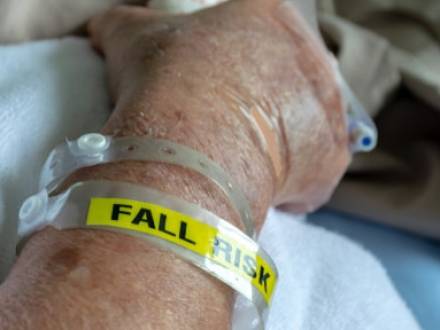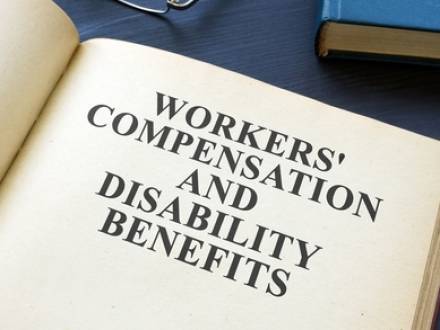Recent Blog Posts
Common Types of Work Injuries That May Affect Office Employees
 When people think of workplace injuries, they often picture construction sites or industrial accidents. However, office employees can also suffer serious injuries while performing their jobs. Even in a seemingly safe environment, repetitive motion, slip and falls, or ergonomic issues can lead to significant health problems. If an office worker is injured on the job in Joliet, Illinois, they may be entitled to workers' compensation benefits. An experienced workers' compensation attorney can help ensure they receive the benefits they deserve.
When people think of workplace injuries, they often picture construction sites or industrial accidents. However, office employees can also suffer serious injuries while performing their jobs. Even in a seemingly safe environment, repetitive motion, slip and falls, or ergonomic issues can lead to significant health problems. If an office worker is injured on the job in Joliet, Illinois, they may be entitled to workers' compensation benefits. An experienced workers' compensation attorney can help ensure they receive the benefits they deserve.
Common Accidents and Injuries in Office Environments
Office workers are vulnerable to a range of injuries that may arise from everyday tasks and workplace conditions. Some of the most common accidents and injuries include:
- Slip, Trip, and Fall Accidents: Office environments can present various tripping and slipping hazards, including wet or slippery floors, loose carpeting, uneven flooring, electrical cords or cluttered walkways, and poor lighting in hallways or stairwells. Falls can result in serious injuries such as fractures, sprains, concussions, or back injuries.
6 Reasons Fall Injuries May Occur in Nursing Homes
 Falls are a serious concern for nursing home residents. Elderly people may be unsteady on their feet, and they may need assistance as they move about a nursing home. When fall accidents occur, nursing home residents who are in frail condition may suffer severe injuries such as fractures, head trauma, back injuries, or serious strains and sprains. Many of these falls are preventable, and they may happen due to negligence by a nursing home or its staff.
Falls are a serious concern for nursing home residents. Elderly people may be unsteady on their feet, and they may need assistance as they move about a nursing home. When fall accidents occur, nursing home residents who are in frail condition may suffer severe injuries such as fractures, head trauma, back injuries, or serious strains and sprains. Many of these falls are preventable, and they may happen due to negligence by a nursing home or its staff.
When a nursing home fails to provide the proper care and supervision, it may be held liable for injuries sustained by residents. An experienced attorney can help a family take legal action to hold a facility accountable for the harm a person has suffered due to negligence.
Common Causes of Falls in Nursing Homes
Nursing home residents are often at a higher risk of falling due to age-related conditions and limitations on their mobility. Staff members should provide assistance when needed while addressing any safety concerns that could increase the risk of falls. When a nursing home fails to take the necessary measures, fall accidents may occur due to issues such as:
Understanding Criminal Damage to Property Charges
 Vandalizing another party’s property or interfering with the use of another party’s premises can get you into serious legal trouble in Illinois. You could even be charged with a felony for criminal damage to property if you cause more than $500 worth of damage. Illinois’s criminal damage to property statute covers acts of vandalism, like smashing a window or destroying the victim’s outdoor decorations. However, it also covers actions designed to interfere with the owner’s use of his property, such as throwing a stink bomb into someone’s home or place of business. While a lot of people see causing damage to property as a relatively harmless youthful misbehavior, a criminal damage to property charge can come with serious repercussions. You need an experienced Joliet, IL property crimes lawyer to help you fight back if you are facing criminal damage charges. Even if you are only facing misdemeanor charges, this type of conviction can have a lasting impact.
Vandalizing another party’s property or interfering with the use of another party’s premises can get you into serious legal trouble in Illinois. You could even be charged with a felony for criminal damage to property if you cause more than $500 worth of damage. Illinois’s criminal damage to property statute covers acts of vandalism, like smashing a window or destroying the victim’s outdoor decorations. However, it also covers actions designed to interfere with the owner’s use of his property, such as throwing a stink bomb into someone’s home or place of business. While a lot of people see causing damage to property as a relatively harmless youthful misbehavior, a criminal damage to property charge can come with serious repercussions. You need an experienced Joliet, IL property crimes lawyer to help you fight back if you are facing criminal damage charges. Even if you are only facing misdemeanor charges, this type of conviction can have a lasting impact.
What Does Permanent and Total Disability Mean?
 Few people need workers’ compensation more than those whose work has left them disabled. If you are unable to work at all now because of a workplace injury or occupational illness, you may qualify for permanent and total disability benefits through workers’ compensation. Permanent and total disability benefits are designed to partially compensate you for the loss of your future earnings. Workers who have been deemed completely disabled can receive two-thirds of the salary they were paid while working. This is in addition to the medical benefits you would ordinarily qualify for through workers’ compensation. It is particularly important to be represented by a well-qualified Joliet, IL workers’ compensation attorney when you are applying for permanent and total disability. You are more likely to encounter resistance when filing this type of claim due to the amount of money potentially at stake.
Few people need workers’ compensation more than those whose work has left them disabled. If you are unable to work at all now because of a workplace injury or occupational illness, you may qualify for permanent and total disability benefits through workers’ compensation. Permanent and total disability benefits are designed to partially compensate you for the loss of your future earnings. Workers who have been deemed completely disabled can receive two-thirds of the salary they were paid while working. This is in addition to the medical benefits you would ordinarily qualify for through workers’ compensation. It is particularly important to be represented by a well-qualified Joliet, IL workers’ compensation attorney when you are applying for permanent and total disability. You are more likely to encounter resistance when filing this type of claim due to the amount of money potentially at stake.
Understanding The Rules of a Restricted License
 If you have recently been arrested for DUI, you have likely already discovered how difficult losing your driving privileges can make things. Many DUI defendants are more upset by the loss of their driver’s license than any other aspect of the case. It is not easy to function in society when you do not have ready transportation. Fortunately, most first-time DUI defendants and even some repeat offenders can get a temporary restricted driving permit (RDP). This limited driver’s license only allows you to drive to specific places for specific and necessary reasons. There is also a strict application process you must go through to prove that you qualify for an RDP. If you are granted a restricted license, you will have to comply with the conditions listed on your permit. This often includes installing a device that tests your BAC before you can start the car and randomly while driving.
If you have recently been arrested for DUI, you have likely already discovered how difficult losing your driving privileges can make things. Many DUI defendants are more upset by the loss of their driver’s license than any other aspect of the case. It is not easy to function in society when you do not have ready transportation. Fortunately, most first-time DUI defendants and even some repeat offenders can get a temporary restricted driving permit (RDP). This limited driver’s license only allows you to drive to specific places for specific and necessary reasons. There is also a strict application process you must go through to prove that you qualify for an RDP. If you are granted a restricted license, you will have to comply with the conditions listed on your permit. This often includes installing a device that tests your BAC before you can start the car and randomly while driving.
Who Pays My Claim in a Multi-Vehicle Crash?
 On February 9th, eight vehicles tangled in a crash on I-80. The Joliet Fire Department had to extricate one driver and needed five ambulances to take seven injured victims to nearby hospitals. Seven more people refused medical treatment after the multi-vehicle collision.
On February 9th, eight vehicles tangled in a crash on I-80. The Joliet Fire Department had to extricate one driver and needed five ambulances to take seven injured victims to nearby hospitals. Seven more people refused medical treatment after the multi-vehicle collision.
Accidents involving more than two vehicles are more common than you might think. Although you may qualify to pursue compensation for your damages, you need to know who was responsible for causing your crash first. When multiple cars are involved, determining fault is complicated. A knowledgeable Will County, IL car accident attorney can investigate your accident, establish fault and liability, and work hard to help you get as much compensation as you deserve.
How Is Fault Determined in Multiple-Car Collisions?
A detailed investigation is necessary to determine the cause of a chain-reaction crash. These collisions do not happen simultaneously; instead, a single crash has a domino effect. For example, a high-speed rear-end impact can push the struck car into the vehicle ahead of it, and so on. Each individual crash must be investigated.
How Valentine's Day Affects Domestic Violence Arrests
 Valentine’s Day is supposed to be a day when romantic relationships are celebrated, and couples enjoy a romantic evening together. Sources are divided on whether domestic violence incidents increase or decrease on Valentine’s Day. Some sources, including Psychology Today, report that domestic violence-related calls to the police usually decrease slightly on Valentine’s Day and then begin to peak again in the following days. Other sources report that police respond to more domestic disputes on Valentine’s Day. Our experienced Will County, IL domestic violence attorneys have seen firsthand that many people arrested for domestic violence do not fit the stereotype of a habitual abuser but instead simply had an argument get out of hand. Police do not always succeed in arresting the primary aggressor, and there is often little to no evidence that an assault took place.
Valentine’s Day is supposed to be a day when romantic relationships are celebrated, and couples enjoy a romantic evening together. Sources are divided on whether domestic violence incidents increase or decrease on Valentine’s Day. Some sources, including Psychology Today, report that domestic violence-related calls to the police usually decrease slightly on Valentine’s Day and then begin to peak again in the following days. Other sources report that police respond to more domestic disputes on Valentine’s Day. Our experienced Will County, IL domestic violence attorneys have seen firsthand that many people arrested for domestic violence do not fit the stereotype of a habitual abuser but instead simply had an argument get out of hand. Police do not always succeed in arresting the primary aggressor, and there is often little to no evidence that an assault took place.
The Danger Posed by Retirement-Age Truck Drivers
 Truck driving can be an appealing job for a recently retired person to take up. Truck drivers get to travel and see the country while getting paid to drive. Some retired couples even get their CDLs together so that they can work together and drive in shifts. This can be great for people who retire from their primary career early, in their early 60’s or so. However, aging adults can start to experience a myriad of physical and mental health conditions that might impair their driving. While there are mechanisms for revoking an aging driver’s CDL for medical reasons, this is not always done in time. If you were injured in a truck accident caused by an aging driver who should not have been on the road, you should speak to an experienced Will County, IL truck accident attorney. You may be entitled to significant compensation.
Truck driving can be an appealing job for a recently retired person to take up. Truck drivers get to travel and see the country while getting paid to drive. Some retired couples even get their CDLs together so that they can work together and drive in shifts. This can be great for people who retire from their primary career early, in their early 60’s or so. However, aging adults can start to experience a myriad of physical and mental health conditions that might impair their driving. While there are mechanisms for revoking an aging driver’s CDL for medical reasons, this is not always done in time. If you were injured in a truck accident caused by an aging driver who should not have been on the road, you should speak to an experienced Will County, IL truck accident attorney. You may be entitled to significant compensation.
Fatigue Affects Aging Drivers Differently
Driver fatigue is one of the leading causes of trucking accidents. There is a reason all drivers are required to take breaks according to a strict schedule. Hours of service laws, as they are called, are designed to make sure that truck drivers get adequate rest and do not make mistakes due to being overly tired. However, the hours of service regulations are designed for truckers who are reasonably fit and healthy. Older adults may require longer and more frequent rest breaks to prevent dangerous levels of fatigue.
Defending a DUI Case After a Crash with Injuries
 Normally, an uncomplicated DUI is a misdemeanor. If you were simply pulled over by the police because you were seen swerving, driving with a missing headlight, or breaking another traffic law and were found to be intoxicated, you are probably being charged with a misdemeanor. However, if you caused a car crash that left someone injured, your situation is much more serious. You may be facing felony charges for DUI with great bodily harm. If you were involved in an accident that left someone injured and subsequently got arrested for drunk driving, you need an experienced Joliet, IL felony DUI lawyer to fight for you. Felony DUI can carry significant prison time and should be taken very seriously.
Normally, an uncomplicated DUI is a misdemeanor. If you were simply pulled over by the police because you were seen swerving, driving with a missing headlight, or breaking another traffic law and were found to be intoxicated, you are probably being charged with a misdemeanor. However, if you caused a car crash that left someone injured, your situation is much more serious. You may be facing felony charges for DUI with great bodily harm. If you were involved in an accident that left someone injured and subsequently got arrested for drunk driving, you need an experienced Joliet, IL felony DUI lawyer to fight for you. Felony DUI can carry significant prison time and should be taken very seriously.
Possible Defense Strategies for DUI With Injury
There are several ways to defend your case when you are charged with DUI with injury. One option is to fight back against the underlying drunk driving allegation using common DUI defenses, such as challenging the blood or breath test used to establish your B.A.C. If the state will probably not be able to prove that you were driving under the influence of alcohol or other drugs, your DUI charge may be dropped, or you may be able to have your charges reduced to reckless driving.
How a DUI Arrest May Impact Your Job
 Getting arrested for drunk driving can have serious career implications for some people. While Illinois does offer some legal protections for employees with criminal convictions or arrest histories, there are plenty of ways a DUI arrest could affect your job or future job prospects. At a minimum, you will likely need to discuss your arrest with your boss or HR, especially if you unexpectedly did not arrive for a shift because you were in jail. You are most likely to face adverse career impacts if you hold a professional license or if your job duties include driving. An experienced Will County, IL DUI attorney can work to minimize the overall impact your recent DUI arrest will have on your life.
Getting arrested for drunk driving can have serious career implications for some people. While Illinois does offer some legal protections for employees with criminal convictions or arrest histories, there are plenty of ways a DUI arrest could affect your job or future job prospects. At a minimum, you will likely need to discuss your arrest with your boss or HR, especially if you unexpectedly did not arrive for a shift because you were in jail. You are most likely to face adverse career impacts if you hold a professional license or if your job duties include driving. An experienced Will County, IL DUI attorney can work to minimize the overall impact your recent DUI arrest will have on your life.
Can I Get Fired for Getting a DUI?
Generally, an employer cannot fire you just for getting arrested or even just for getting convicted of a crime in Illinois. However, there are many exceptions to this rule. First, if your job involves driving, you could be fired for getting convicted of a DUI. In that case, your conviction would be substantially related to your job duties, and allowing you to continue doing that job would give you the opportunity to re-offend.
 815-727-0100
815-727-0100













